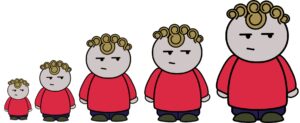What, More Costs?

A decade ago, we noted that not a single country on earth had been known to experience a declining rate of obesity during its most recent year. In the United States, that signified an enormous win for the food industry, which was selling an additional $20 billion worth of food per annum, thanks to the extra $400 worth of their products being consumed annually by the average American kid, as compared to the previous year.
Of course, the math varies from one country to the next, which in a sinister sense doesn’t even matter, since the overlords who rake in the profits have dominion over the whole planet anyway. While snacking or dining in jets or yachts, they regard themselves as the only genuine world citizens. In each port of call, they know how to obtain the most health-inducing vegetables, fruits, meats, seafood, and beverages to buy with the dimes and dollars of chubby little children far away.
Fun fact: Despite their busy lives, CEOs in the food industry (and every other business) tend to consult medical experts in the fitness field, and are quite likely to spend part of their colossal earnings on a staff member dedicated to helping them stay in admirable physical condition.
Inexorable math
Back in the day, it was Dr. Tim Lobstein, spokesperson for the World Obesity Foundation, who said it best: “Fat children are an investment in future sales.” Here at home, just like everywhere, obviously, every seller’s profit comes at some buyer’s expense. In our case, it was American parents and institutions — everybody who ever bought a doughnut or a burger for a child — who have paid the price.
Of course, by now, many of those overweight young people have taken over the responsibility for paying their own food bills, while in the meantime, all the dire predictions have come true.
Another dimension
In world news, massive attention has been paid lately to both the known and suspected illegal and shameful interference with children, carried out by wealthy and well-known international Important People. Meanwhile, all this time, right in front of our noses, it is totally true and inescapably obvious that children have been perfectly trained and impeccably groomed in another dimension of human behavior. Exactly as intended and predicted, the chunky cherubs of yesteryear have grown into a nation of obedient consumers of empty calories, flashy colors, and harmful, revolting additives.
The cost of obesity to society as a whole is a topic not easy to let go of. For most Americans, every dollar counts, whoever it is spent by and whatever it is spent on. We may disagree on the specifics, but ultimately, a very great majority of people agree on one basic principle: A lot of money is being spent on certain things, which they believe should be spent on something else instead.
Footnote
Incidentally, is there something perversely unmagical about the number 5? As a recent post pointed out,
The total number of babies born in the USA in a year is around 3.6 million. Since about one in five will be obese, that means around 720,000 unhappy fat kids.
In other words, each year, more than half a million young Americans mature into the ranks of the obese youth. In a strange, historically unprecedented twist of fate, a large percentage of young people are physically unfit and, in case the country might need to be defended, ineligible to join the armed forces.
Another unfortunate appearance of the numeral was spotted recently and will be explored further: “Obese Children Face Nearly 5-Fold Higher Risk of Fractures, Study Finds.”
Your responses and feedback are welcome!
Image by Open Clipart-Vectors/Pixabay










 FAQs and Media Requests:
FAQs and Media Requests: 











